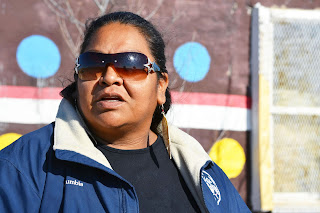The Tokala Warrior Society
By Greg Forbes
Pine Ridge, S.D. - Before the American Indian Movement came to prominence, its predecessor served as a peaceful, non-militant group which worked to preserve the Lakota way of life. Today, one woman has joined the movement to encourage Lakota youth to remember their culture.
Mother War uses the Tokala Warrior Society as a way to demonstrate to Lakota youth the pride and power once abundant among Lakota people. The Tokala Society started as a movement to preserve and protect Lakota traditions and culture. Using her experiences with the American Indian Movement, she strives to ignite a fire of cultural rebirth in the hearts of Indian youth.
As a youth, she was constantly exposed to Indian culture and traditions. While the government banned traditional religious practices, her grandparents opened up their small home as a safe place for ceremonies.
Unfortunately, she also grew up in a family that conformed to oppression. Because of the high rate of alcoholism both today and in the past, several members of her family, including her mother, succumbed to the pressures of alcohol. Learning by example, she too abused alcohol and spent time in prison as a result.
After Mother War missed her grandmother’s funeral, she knew she had to change and go back to the traditions her grandmother taught her.
“It would be the sickest thing I could do,” she said in regards to continuing to “fall for the white man’s tricks” after her release from prison.
With alcoholism at a rate of nearly 80 percent on the Pine Ridge, she continued to see her own family members struggle with alcoholic abuse. Aside from alcohol, Pine Ridge has a high unemployment rate at nearly 85 percent and nearly 97 percent of the population lives below the federal poverty level.
She has witnessed people getting into violent fights over National American Heritage Association (NAHA) donations. In late October, NAHA dropped large shipments of hand sanitizer on the reservation and the bottles disappeared quickly. Because of the unavailability of alcohol on the reservation and the high alcohol content in hand sanitizer, Mother War thinks residents snatched the bottles up to drink.
Mother War said these are just tricks that try to rob the Lakota of their livelihood. Sick of the vicious cycle in her family and Lakota families, she opened her house to the Tokala Warrior Society last year.
She started this movement last year and handpicks recruits from families who fight alcoholism and oppression.
Every Friday, in her small living room, anywhere from a dozen to 20 teenagers gather to learn and practice the traditional Lakota culture as well as serve as a policing body for the Lakota community. In their first act as a society, they welcomed an opponent of the controversial Keystone Pipeline and stood in support as he spoke against it.
She explained the Tokala stood guard during the Keystone demonstration not only because it will affect her grandchildren but will also affect the lives of everyone’s future grandchildren, including non-reservation citizens.
And while Mother War stands as a firm and dedicated leader to the Tokala Warrior Society and its youth, she understands the importance of leading by example. Therefore, she enforces a strict no alcohol policy not only among the group, but for her own home and family members as well. Without providing an honest model for her followers, she knows her mission for reform will be impossible and the cycle will continue.
“Everything is a trick. Don’t fall for it. That’s what I put in to these youth,” she said. “If you fall for it, the younger ones will see it and fall for it too.
It’s something I could never tell you,” she continued. “I have to live as an example. You just have to see.”
Leo, a 17 year-old member of the Tokala Warrior Society, knows first hand that words are useless without action.
“We can’t be a cartoon character,” he said. “We have to show humans have heart.”
Leo stands as a perfect example of what Mother War strives so hard to shape. At just 17 years old, Leo is learning traditional medicene. He understands every native herb and its healing abilities in what it does for the heart, the mind and the soul. He too understands that the culture is alive and worth fighting for.
“We still have the culture in our hearts and minds,” he said. “It all centers around one mind, one thought, one prayer.”
Mother War sees Leo as the natural leader of the group. She said he is always willing to make appearances on behalf of the Tokala and provides a supreme example of dedication.
Sometimes, she said, staying involved with the group becomes difficult with the ridicule and pressure faced by peers. But Leo knows that in order to get things done for not only the future of his children and great-grandchildren but for the future of the Lakota as a whole, one must stay true to his or her heart.
“We don’t pay attention to doubters,” he said. “Just keep doing what’s right.”
Photos by Ashli Johannsen






